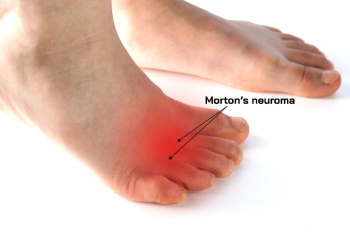
Morton's neuroma is a painful condition affecting the ball of the foot, typically between the third and fourth toes. It involves the thickening of tissue surrounding one of the nerves leading to the toes, causing sharp, burning pain, numbness, or a sensation of something being lodged in the foot. To diagnose Morton's neuroma, a podiatrist will perform a physical examination, checking for tenderness and a palpable mass between the toes. Imaging tests like ultrasound or MRI scans may be used for confirmation. Treatment options include modifying footwear to reduce pressure on the affected area, using orthotic inserts, and administering corticosteroid injections to reduce inflammation. In severe cases, surgical removal of the affected nerve may be necessary to alleviate symptoms and restore normal foot function. If you have pain in the ball of your foot, it is suggested that you schedule an appointment with a podiatrist for a proper diagnosis and treatment plan.
Morton’s neuroma is a very uncomfortable condition to live with. If you think you have Morton’s neuroma, contact Dr. Odin De Los Reyes of Connecticut. Our doctor will attend to all of your foot care needs and answer any of your related questions.
Morton’s Neuroma
Morton's neuroma is a painful foot condition that commonly affects the areas between the second and third or third and fourth toe, although other areas of the foot are also susceptible. Morton’s neuroma is caused by an inflamed nerve in the foot that is being squeezed and aggravated by surrounding bones.
What Increases the Chances of Having Morton’s Neuroma?
- Ill-fitting high heels or shoes that add pressure to the toe or foot
- Jogging, running or any sport that involves constant impact to the foot
- Flat feet, bunions, and any other foot deformities
Morton’s neuroma is a very treatable condition. Orthotics and shoe inserts can often be used to alleviate the pain on the forefront of the feet. In more severe cases, corticosteroids can also be prescribed. In order to figure out the best treatment for your neuroma, it’s recommended to seek the care of a podiatrist who can diagnose your condition and provide different treatment options.
If you have any questions, please feel free to contact our offices located in Southbury and Farmington, CT . We offer the newest diagnostic and treatment technologies for all your foot care needs.
